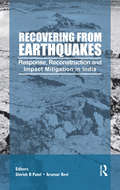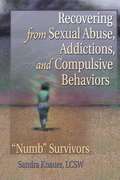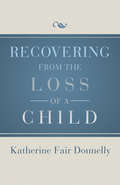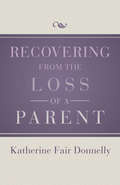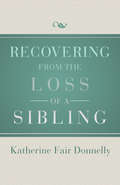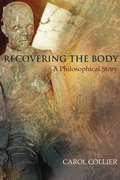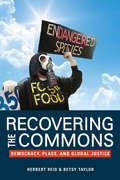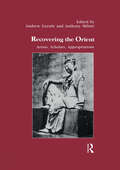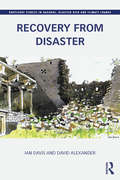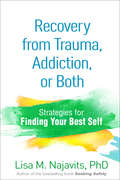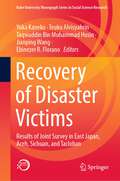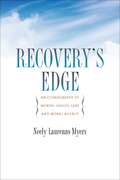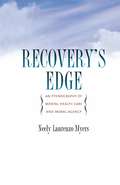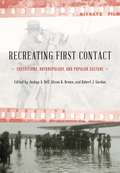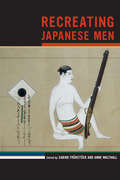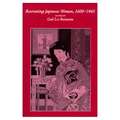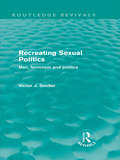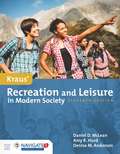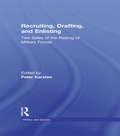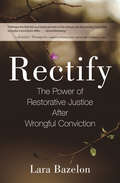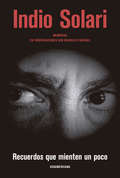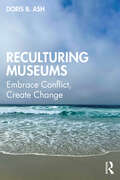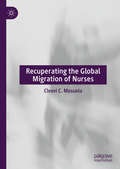- Table View
- List View
Recovering from Earthquakes: Response, Reconstruction and Impact Mitigation in India
by Shirish B Patel Aromar ReviEarthquakes come without warming, and often cause massive devastation, resulting not only in the loss of property but also of lives. Many of the survivors suffer from intense and lasting psychological trauma. This book covers the experience of recent earthquakes in India, and what has been learnt (and what we have failed to learn) in the process of managing the aftermath in each case. This includes immediate medical attention, long-term mental health care, and the reconstruction of housing and infrastructure in both rural and urban areas. The experiences of the contributors, many of whom have actively contributed their expertise to disaster management and recovery, help us understand what problems require a swift response and which aspects should be based on detailed analyses keeping in mind local conditions. Reconstruction is seen as offering an opportunity to rebuild society such that all sections of the population are empowered and brought into the community’s decision-making process. It is also an opportunity to develop construction techniques that are suited to local materials and skills but are also more earthquake-resistant than the old. And finally, there is the realisation that the best first responders are local community groups which need to be nurtured, and trained in crisis management and risk mitigation.
Recovering from Genocidal Trauma
by Myra GiberovitchSince the Second World War people have become aware of the trauma associated with genocide and other crimes against humanity. Today, assisting mass atrocity survivors, especially as they age, poses a serious challenge for service providers around the world.Recovering from Genocidal Trauma is a comprehensive guide to understanding Holocaust survivors and responding to their needs. In it, Myra Giberovitch documents her twenty-five years of working with Holocaust survivors as a professional social worker, researcher, educator, community leader, and daughter of Auschwitz survivors.With copious personal and practical examples, this book lays out a strengths-based practice philosophy that guides the reader in how to understand the survivor experience, develop service models and programs, and employ individual and group interventions to empower survivors. This book is essential for anyone who studies, interacts, lives, or works with survivors of mass atrocity.
Recovering from Sexual Abuse, Addictions, and Compulsive Behaviors: “Numb” Survivors
by Carlton Munson Sandra L. KnauerExplore the connection between sexual victimization, addiction, and compulsive behaviors!This book demonstrates clearly what lengths survivors of sexual abuse will go to in attempting to avoid dealing with the pain resulting from their sexual abuse. Anyone who has been sexually abused is likely to have one of the addictions or compulsive behaviors described herein. The information in Recovering from Sexual Abuse, Addictions, and Compulsive Behaviors regarding codependency is especially useful to survivors of sexual abuse who now find themselves in abusive relationships. Survivors of abuse who have gone without treatment sometimes become either sexual perpetrators or sexual addicts and may experience many different types of psychological dysfunction. Recovering from Sexual Abuse, Addictions, and Compulsive Behaviors examines issues that survivors often have regarding: trust and friendship sexuality and sexual addiction marriage and family religious addiction as opposed to spirituality alcohol and substance abuse workaholism weight issues and eating disorders violence as the result of shame, fear, and depression caused by abuseRecovering from Sexual Abuse, Addictions, and Compulsive Behaviors is more than a litany of the problems that survivors face. This valuable work will show you: HOW the survivor came to employ addictive or compulsive behaviors WHY the survivor continues to employ these self-abusive behaviors despite the pain caused by the addiction WHAT the survivor needs to do to aid recovery WHERE the survivor can turn to obtain the help that is needed to recover from addictive or compulsive behaviorsWith its complete bibliography and up-to-date information on sexual abuse, addictions, and compulsive behaviors, Recovering from Sexual Abuse, Addictions, and Compulsive Behaviors will show you the full course of sexual abuse and its aftermath, bringing you from the beginnings of sexual abuse through the steps that lead to addiction and compulsion, and ultimately, recovery.
Recovering from the Loss of a Child
by Katherine Fair DonnellyAn extremely well-written, compassionate guide for the millions of people who come face to face with a death in their own families The pain and shock when a child dies can seem unbearable. But expert-on-grief Katherine Fair Donnelly, who has suffered many personal losses, has gained wisdom and strategies for emotional recovery. By sharing, understanding, and accepting this tragic loss, bereaved parents, siblings, and others can cope with this intense grief. Intimate, telling interviews with survivors present practical ways in which surviving family members can take the necessary steps toward recovering from their devastating loss.
Recovering from the Loss of a Parent
by Katherine Fair DonnellyAn extremely well-written, compassionate guide for the millions of people who come face to face with a death in their own families Losing a parent is a traumatic blow, and the grief can seem unbearable. But you are not alone, and you can get through this. In this first book dedicated to the experience of adults who have lost a parent, expert-on-grief Katherine Fair Donnelly shares intimate, telling interviews with surviving sons and daughters, and presents practical ways in which surviving family members can take steps toward recovering from their devastating loss.
Recovering from the Loss of a Sibling
by Katherine Fair DonnellyAn extremely well-written, compassionate guide for the millions of people who come face to face with a death in their own families When a brother or sister dies, surviving siblings often receive little support or recognition of their pain. But their grief is real, and there is a way to recover from it. Through intimate, true stories and interviews with brothers and sisters who have lost a sibling, expert-on-grief Katherine Fair Donnelly provides valuable insight on how to survive this traumatic experience. Recovering from the Loss of a Sibling is the first guide dedicated to those who have lost a brother or sister, and presents practical ways they can take the necessary steps toward recovering from their devastating loss.
Recovering the Body: A Philosophical Story
by Carol CollierFollowing the metaphysical and epistemological threads that have led to our modern conception of the body as a machine, the book explores views of the body in the history of philosophy. Its central thesis is that the Cartesian paradigm, which has dominated the modern conception of the body (including the development and practice of medicine), offers an incomplete and even inaccurate picture. This picture has become a reductio ad absurdum, which, through such current trends as the practice of extreme body modification, and futuristic visions of downloading consciousness into machines, could lead to the disappearance of the biological body. Presenting Spinoza’s philosophy of the body as the road not followed, the author asks what Spinoza would think of some of our contemporary body visions. It also looks to two more holistic approaches to the body that offer hope of recovering its true meaning: the practice of yoga and alternative medicine. The metaphysical analysis is accompanied throughout by a tripartite historical and epistemological analysis: the body as an obstacle to knowledge (exemplified by Plato and our modern-day futurists), the body as an object of knowledge (exemplified by Descartes and modern scientific medicine); and the body as a source of knowledge (exemplified by the Stoics, and the philosophy of yoga). - This book is published in English.
Recovering the Commons: Democracy, Place, and Global Justice
by Herbert Reid Betsy TaylorThis penetrating work culls key concepts from grassroots activism to hold critical social theory accountable to the needs, ideas, and organizational practices of the global justice movement. The resulting critique of neoliberalism hinges on place-based struggles of groups marginalized by globalization and represents a brave rethinking of politics, economy, culture, and professionalism. Providing new practical and conceptual tools for responding to human and environmental crises in Appalachia and beyond, Recovering the Commons radically revises the framework of critical social thought regarding our stewardship of the civic and ecological commons. Herbert Reid and Betsy Taylor ally social theory, field sciences, and local knowledge in search of healthy connections among body, place, and commons that form a basis for solidarity as well as a vital infrastructure for a reliable, durable world. Drawing particularly on the work of philosophers Maurice Merleau-Ponty, John Dewey, and Hannah Arendt, the authors reconfigure social theory by ridding it of the aspects that reduce place and community to sets of interchangeable components. Instead, they reconcile complementary pairs such as mind/body and society/nature in the reclamation of public space. With its analysis embedded in philosophical and material contexts, this penetrating work culls key concepts from grassroots activism to hold critical social theory accountable to the needs, ideas, and organizational practices of the global justice movement. The resulting critique of neoliberalism hinges on place-based struggles of groups marginalized by globalization and represents a brave rethinking of politics, economy, culture, and professionalism.
Recovering the Orient: Artists, Scholars, Appropriations
by Anthony Milner Andrew GerstleMuch recent writing about Asian societies and Asian Histories adopts a homogenising vision of humanity. It views the definition of cultural difference as an 'Orientalist' project serving colonial or neo-colonial purposes. This unusual collection of essays, written by leading specialists in a range of disciplines. re-appraises and expands the 'Orientalism' debate. Several authors examine the ways in which the Asian 'other' acts as a creative stimulus for the European artist, composer and playwright. The work of Monet, Debussy and Brecht, for instance, is explored to suggest a subtle and complex circulation of idea between the 'Orient' and the 'West'. Other essays investigate the scholar’s own encounter with the exotic, in particular they ask to what extent Western concepts and categories can be used in the analysis of Asian societies and cultures. Among the concepts considered are 'space' (in Chinese art); 'landscape', 'high art', 'low art' and 'opera' (in Indonesia) and 'tragedy', the 'book', concert music' and 'subjectivity' (in Japan). Furthermore, the implications of orality and literacy are examined in the case of Malay society. Like discredited orientalists, the authors of this volume are in most cases based in the West- in universities in Europe, United Sates and Australia- but their investigations are not grounded in confident assumptions about Western power and civilisation. Recovering the Orient probes the Asian 'other' at a time of conceptual uncertainty, when foundational tenets of Western civilisation have come under question.
Recovery from Disaster (Routledge Studies in Hazards, Disaster Risk and Climate Change)
by David Alexander Ian DavisDisasters can dominate newspaper headlines and fill our TV screens with relief appeals, but the complex long-term challenge of recovery—providing shelter, rebuilding safe dwellings, restoring livelihoods and shattered lives—generally fails to attract the attention of the public and most agencies. On average 650 disasters occur each year. They affect more than 200 million people and cause $166 trillion of damage. Climate change, population growth and urbanisation are likely to intensify further the impact of natural disasters and add to reconstruction needs. Recovery from Disaster explores the field and provides a concise, comprehensive source of knowledge for academics, planners, architects, engineers, construction managers, relief and development officials and reconstruction planners involved with all sectors of recovery, including shelter and rebuilding. With almost 80 years of first-hand experience of disaster recovery between them, Ian Davis (an architect) and David Alexander (a geographer) draw substantially from first-hand experiences in a variety of recovery situations in China, Haiti, Italy, Japan, New Zealand, Pakistan, the Philippines and the USA. The volume is further enriched by two important and unique features: 21 models of disaster recovery are presented, seven of which were specifically developed for the book. The second feature is a survey of expert opinion about the nature of effective disaster recovery—the first of its kind. More than 50 responses are provided in full, along with an analysis that integrates them with the theories that underpin them. By providing a framework and models for future study and applications, Davis and Alexander seek both to advance the field and to provide a much-needed reference work for decision makers. With a broad perspective derived from the authors' roles held as university professors, researchers, trainers, consultants, NGO directors and advisors to governments and UN agencies, this comprehensive guide will be invaluable for practitioners and students of disaster management.
Recovery from Trauma, Addiction, or Both: Strategies for Finding Your Best Self
by Lisa M. NajavitsTrauma and addiction are two of the most common and difficult issues that people face--but it truly is possible to heal. In this motivating book, leading expert Lisa Najavits explains the link between trauma and addiction and presents science-based self-help strategies that you can use no matter where you are in your recovery. Every chapter features inspiring words from people who have "been there," plus carefully designed reflection questions, exercises, and other practical tools. Learn how you can: *Build coping skills so that the future is better than the past. *Keep yourself safe and find support. *Set your own goals and make a plan to achieve them at your own pace. *Choose compassion over self-blame and shame. *Move toward your best self--the person you want to be. Mental health professionals, see also the author's Seeking Safety: A Treatment Manual for PTSD and Substance Abuse, which presents an evidence-based treatment approach developed specifically for PTSD and substance abuse.
Recovery of Disaster Victims: Results of Joint Survey in East Japan, Aceh, Sichuan, and Tacloban (Kobe University Monograph Series in Social Science Research)
by Yuka Kaneko Jianping Wang Teuku Alvisyahrin Taqwaddin Bin Muhammad Husin Ebinezer R. FloranoThis book presents the results of a joint survey conducted as of the tenth anniversary of the 2011 East Japan Earthquake, by an international research collaboration consisting of researchers representing the major universities affected by recent mega-disasters in Asia, namely, the research group at Kobe University, Japan which has folllowed up ten year recovery process from the 2011 tsunami disaster in East Japan, the research group at the Graduate Program in Disaster Science, Syiah Kuala University in Aceh, Indonesia on the long-term recovery of 17 years after the 2004 Indian Ocean Tsunami, the research group at the Institute for Disaster Management and Reconstruction of Sichuan University, China focusing on the recovery status of 13 years after the 2008 Sichuan (Wenchuan) Earthquake; and the research group at the National College of Public Administration and Governance of University of the Philippines, on the rcovery from the 2013 Typhoon Yolanda that hit the Philippines. The purpose of the survey was to evaluate the status of human life recovery of disaster-affected populations and communities in Asia in the long term, for the ultimate purpose of reviewing and comparing the outcomes of different prioritizations among the plural goals of disaster recovery. Through such a review, the authors intend to induce policy implications to guide a better recovery process with lesser impact on the human life recovery in the future disasters that we humans are destined to meet. The target areas are 16 districts in Iwate and Miyagi prefectures in Japan, all typical areas seriously affected by the 2011 tsunami and subsequently came under the governmental construction works for the safety, as well as three villages in Banda Aceh and its outskirts in Aceh Special Province, Indonesia,; two districts in Mianyang city in Sichuan, China which were targetted by intensive reconstructon works conducted by the coupling assistance; and two village communities in Tacloban, the capital city of Leyte island hit by the 2013 Typhoon Yolanda. To realize the concurrent attainment of both safety and livelihood in the recovery planning, this joint survey has identified common issues for a successful cooperation between the local government and communities through the inclusive participation of various institutions representing the variety of interests in each community.
Recovery's Edge: An Ethnography Of Mental Health Care And Moral Agency
by Neely Laurenzo MyersIn 2003 the Bush Administration's New Freedom Commission asked mental health service providers to begin promoting "recovery" rather than churning out long-term, "chronic" mental health service users. Recovery's Edge sends us to urban America to view the inner workings of a mental health clinic run, in part, by people who are themselves "in recovery" from mental illness. In this provocative narrative, Neely Myers sweeps us up in her own journey through three years of ethnographic research at this unusual site, providing a nuanced account of different approaches to mental health care. Recovery's Edge critically examines the high bar we set for people in recovery through intimate stories of people struggling to find meaningful work, satisfying relationships, and independent living. This book is a recipient of the Norman L. and Roselea J. Goldberg Prize from Vanderbilt University Press for the best book in the area of medicine.
Recovery's Edge: An Ethnography of Mental Health Care and Moral Agency
by Neely Laurenzo MyersIn 2003 the Bush Administration's New Freedom Commission asked mental health service providers to begin promoting "recovery" rather than churning out long-term, "chronic" mental health service users. Recovery's Edge sends us to urban America to view the inner workings of a mental health clinic run, in part, by people who are themselves "in recovery" from mental illness.In this provocative narrative, Neely Myers sweeps us up in her own journey through three years of ethnographic research at this unusual site, providing a nuanced account of different approaches to mental health care. Recovery's Edge critically examines the high bar we set for people in recovery through intimate stories of people struggling to find meaningful work, satisfying relationships, and independent living.This book is a recipient of the Norman L. and Roselea J. Goldberg Prize from Vanderbilt University Press for the best book in the area of medicine.
Recreating First Contact: Expeditions, Anthropology, and Popular Culture
by Joshua A. Bell Alison K. Brown Robert J. GordonRecreating First Contact explores themes related to the proliferation of adventure travel which emerged during the early twentieth century and that were legitimized by their associations with popular views of anthropology. During this period, new transport and recording technologies, particularly the airplane and automobile and small, portable, still and motion-picture cameras, were utilized by a variety of expeditions to document the last untouched places of the globe and bring them home to eager audiences. These expeditions were frequently presented as first contact encounters and enchanted popular imagination. The various narratives encoded in the articles, books, films, exhibitions and lecture tours that these expeditions generated fed into pre-existing stereotypes about racial and technological difference, and helped to create them anew in popular culture. Through an unpacking of expeditions and their popular wakes, the essays (12 chapters, a preface, introduction and afterward) trace the complex but obscured relationships between anthropology, adventure travel and the cinematic imagination that the 1920s and 1930s engendered and how their myths have endured. The book further explores the effects - both positive and negative - of such expeditions on the discipline of anthropology itself. However, in doing so, this volume examines these impacts from a variety of national perspectives and thus through these different vantage points creates a more nuanced perspective on how expeditions were at once a global phenomenon but also culturally ordered.
Recreating Japanese Men
by Sabine Frühstück Anne WalthallThe essays in this groundbreaking book explore the meanings of manhood in Japan from the seventeenth to the twenty-first centuries. Recreating Japanese Men examines a broad range of attitudes regarding properly masculine pursuits and modes of behavior. It charts breakdowns in traditional and conventional societal roles and the resulting crises of masculinity. Contributors address key questions about Japanese manhood ranging from icons such as the samurai to marginal men including hermaphrodites, robots, techno-geeks, rock climbers, shop clerks, soldiers, shoguns, and more. In addition to bringing historical evidence to bear on definitions of masculinity, contributors provide fresh analyses on the ways contemporary modes and styles of masculinity have affected Japanese men's sense of gender as authentic and stable.
Recreating Japanese Women, 1600-1945
by Gail L. BernsteinIn thirteen wide-ranging essays, scholars and students of Asian and women's studies will find a vivid exploration of how female roles and feminine identity have evolved over 350 years, from the Tokugawa era to the end of World War II. Starting from the premise that gender is not a biological given, but is socially constructed and culturally transmitted, the authors describe the forces of change in the construction of female gender and explore the gap between the ideal of womanhood and the reality of Japanese women's lives. Most of all, the contributors speak to the diversity that has characterized women's experience in Japan. This is an imaginative, pioneering work, offering an interdisciplinary approach that will encourage a reconsideration of the paradigms of women's history, hitherto rooted in the Western experience.
Recreating Sexual Politics: Men, Feminism and Politics (Routledge Revivals)
by Victor SeidlerThis thought-provoking book, first published in 1991, examines sexual politics in a world which is being radically changed by the challenges of feminism. Seidler explores how men have responded to feminism, and the contradictory feelings men have towards dominant forms of masculinity. Seidler’s stimulating and original analysis of social and political theory connects personally to everyday issues in people’s lives. It reflects the growing importance of sexual and personal politics within contemporary politics and culture, and demonstrates clearly the challenge that feminism brings to our inherited forms of morality, politics and sexuality.
Recreation And Leisure In Modern Society
by Amy Hurd Daniel McLean Denise M. AndersonEach new print copy includes Navigate 2 Advantage Access that unlocks a comprehensive and interactive eBook, student practice activities and assessments, a full suite of instructor resources, and learning analytics reporting tools. Reorganized and streamlined to enhance learning outcomes, the eleventh edition of Kraus' Recreation and Leisure in Modern Society provides a detailed introduction to the history, developments, and current trends in leisure studies. The Eleventh Edition focuses on the challenges and opportunities impacting the profession--including dramatic demographic changes, new technologies, and innovations in marketing--through an array of pedagogical features, including engaging sidebars and case studies addressing contemporary issues. Focusing on the ten different types of organizations--ranging from nonprofit community organizations and armed forces recreation to sports management and travel and tourism sponsors--the Eleventh Edition is an invaluable resource for students considering a career in the recreation and leisure industry. With Navigate 2, technology and content combine to expand the reach of your classroom. Whether you teach an online, hybrid, or traditional classroom-based course, Navigate 2 delivers unbeatable value. Experience Navigate 2 today at www.jblnavigate.com/2.
Recruiting International Students in Higher Education
by Sylvie LomerThis book offers a comprehensive overview and critical analysis of the UK's policy on recruiting international students. In a global context of international education policy, it examines changes from New Labour policies under Tony Blair's Prime Minister's Initiative, to the more recent Coalition and Conservative Government policies in the International Education Strategy. The research uses a text-based approach to primary research, adopting a critical framework developed by Carol Bacchi ('what is the problem represented to be'?). The book argues that international student policy can be reduced to reasons for and against recruiting international students; in doing so, students are represented as ambassadors for the UK or tools in its public diplomacy, consumers and generators of reputation, means to get money, and as migrants of questionable legitimacy. These homogenizing representations have the potential to shape international education, implicating academics as agents of policy, and infringing on students' self-formation. The book will be compelling reading for students and researchers in the fields of education and sociology, as well as those interested in education policy-making.
Recruiting, Drafting, and Enlisting: Two Sides of the Raising of Military Forces (Military and Society #Vol. 1)
by Peter KarstenFirst Published in 1999. Routledge is an imprint of Taylor & Francis, an informa company.
Rectify: The Power of Restorative Justice After Wrongful Conviction
by Lara BazelonMakes a powerful argument for adopting a model of restorative justice as part of the Innocence Movement so exonerees, crime victims, and their communities can come together to heal.In Rectify, a former Innocence Project director and journalist Lara Bazelon puts a face to the growing number of men and women exonerated from crimes that kept them behind bars for years - sometimes decades - and that devastate not only the exonerees but also their families, the crime victims who mistakenly identified them as perpetrators, the jurors who convicted them, and the prosecutors who realized too late that they helped convict an innocent person.Bazelon focuses on Thomas Haynesworth, a teenager arrested for multiple rapes in Virginia, and Janet Burke, a rape victim who mistakenly IDed him. It took over two decades before he was exonerated. Conventional wisdom points to an exoneration as a happy ending to tragic tales of injustice, such as Haynesworth's. However, even when the physical shackles are left behind, invisible ones can be profoundly more difficult to unlock.In the midst of Bazelon's frustration over the blatant limitations of courts and advocates, her hope is renewed by the fledgling but growing movement to apply the centuries-old practice of restorative justice to wrongful conviction cases. Using the stories of Thomas Haynesworth, Janet Burke, and other crime victims and exonerees, she demonstrates how the transformative experience of connecting isolated individuals around mutual trauma and a shared purpose of repairing harm unite unlikely allies. Movingly written and vigorously researched, Rectify takes to task the far-reaching failures of our criminal justice system and offers a window into a future where the power it yields can be used in pursuit of healing and unity rather than punishment and blame.
Recuerdos que mienten un poco: Memorias. En conversaciones con Marcelo Figueras
by Indio SolariLas memorias del Indio Solari, creador y líder de Patricio Rey y sus Redonditos de Ricota, desde sus orígenes en Paraná hace 70 años hasta hoy, atravesando la historia de sus bandas disco por disco, sus comienzos, sus influencias, su independencia militante, su compleja relación con los medios, sus polémicas, y su presente personal y artístico. La primera autobiografía completa y en primera persona de Carlos Alberto "El Indio" Solari (Paraná, 1949), fundador junto con Skay Beilinson de Patricio Rey y sus Redonditos de Ricota. Mediante el recorrido de su vida y una obra (sus influencias y sus temas) que lo convirtió en icono de la escena contracultural del rock argentino, nos acercamos al contenido de sus letras y sus melodías, sus ídolos, la relación con su público y con la prensa (su renuencia a aparecer en medios masivos), con sus compañeros de bandas y también con los músicos de su generación. Atravesando su trayectoria junto a los Redondos hasta la disolución en 2001; la historia de los cuatro discos que grabó con su nuevo grupo, Los Fundamentalistas del Aire Acondicionado, y su presente -ahora que ha aceptado hablar públicamente sobre su enfermedad-, el Indio, el artista militante del NO-TELEVISIÓN, lo cuenta todo.
Reculturing Museums: Embrace Conflict, Create Change
by Doris B. AshReculturing Museums takes a unified sociocultural theoretical approach to analyze the many conflicts museums experience in the 21st century. Embracing conflict, Ash asks: What can practitioners and researchers do to create the change they want to see when old systems remain stubbornly in place?Using a unified sociocultural, cultural-historical, activity-theoretical approach to analyzing historically bound conflicts that plague museums, each chapter is organized around a central contradiction, including finances ("Who will pay for museums?"), demographic shifts ("Who will come to museums?"), the roles of narratives ("Whose story is it?"), ownership of objects ("Who owns the artifact?"), and learning and teaching ("What is learning and how can we teach equitably?"). The reculturing stance taken by Ash promotes social justice and equity, ‘making change’ first, within museums, called inreach, rather than outside the museum, called outreach; challenges existing norms; is sensitive to neoliberal and deficit ideologies; and pays attention to the structure agency dialectic.Reculturing Museums will be essential reading for academics, students, museum practitioners, educational researchers, and others who care about museums and want to ensure that all people have equal access to the activities, objects, and ideas residing in them.
Recuperating The Global Migration of Nurses
by Cleovi C. MosuelaSitting at the nexus of labor migration and health care work, this book examines the dynamic relationship between nurses’ cross-border movement and efforts to regulate their migration. Grounded in multi-sited qualitative research, this volume analyzes the changing social dimensions and transnational scale of global nursing, focusing particularly on the recruitment from the Philippines to Germany. The flow of nursing skills from resource-poor countries to well-off ones is not only producing a global care crisis, but also serves as a prime example of the international race for talent and skill. As it takes a critical eye to the emerging field of migration governance or management as the preferred policy response to competing discourses of global care crises and the global competition for skilled care work, this book highlights not only the shifting web of actors, discourses, and practices in care work migration management, but also, and more importantly, how various forms of care figure in the global migration of nurses.
